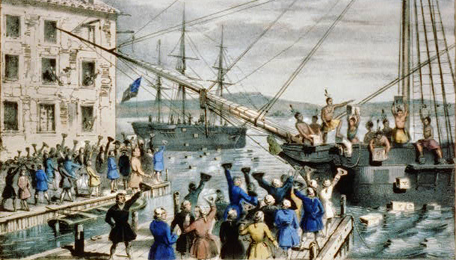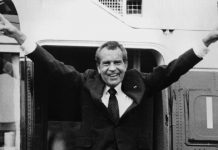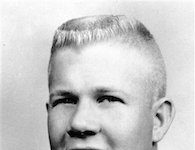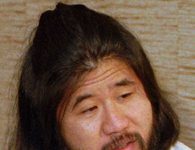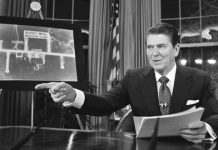On Dec. 16, 1773, members of the Sons of Liberty boarded British ships in Boston Harbor and destroyed their cargo of tea, taking another step toward the Revolutionary War.
“Boston Harbor a Teapot Tonight!”
Needing money to pay off its considerable debts, the British government imposed a series of new taxes on the American Colonies in the 1760s. The taxes—particularly the ones created by the Stamp Act in 1765 and the Townsend Acts, which taxed import goods, in 1767—outraged the colonists, who claimed that they could not be taxed without representation in the British Parliament.
In 1770, faced with increasing hostility in the Colonies, which was intensified by the Boston Massacre that March, the British repealed all the taxes included in the Townsend Acts except for the one on tea. American patriots refused to pay the tax, and illegally smuggled tea into the Colonies.
Meanwhile, the East India Company, a powerful trading company that was an important tool in Britain’s colonial expansion, was nearing bankruptcy. In 1773, the British government excused the East India Company from customs duties and gave it a monopoly on tea importation to America, undercutting the smugglers.
“The Americans would now get their tea at a cheaper price than ever before,” explains EyeWitness to History. “However, if the colonies paid the duty tax on the imported tea they would be acknowledging Parliament’s right to tax them.”
Colonists in port cities blocked East India ships from docking or placed the cargo in warehouses. In Boston, determined East India agents managed to land their ships in spite of the resistance.
On Nov. 28, 1773, three British ships—the Dartmouth, the Eleanor and the Beaver—arrived in Boston Harbor with a cargo of tea, but colonists would not allow the ships to be unloaded. The Sons of Liberty, a secret revolutionary organization led in Boston by Samuel Adams, felt compelled to act.
On the evening of Dec. 16, members of the organization dressed as Mohawk Indians and boarded the ships. Shouting “The Mohawks are come!” and “Boston harbor a teapot tonight!” the patriots split tea chests open with tomahawks and threw 35,000 pounds of leaves overboard. The tea was piled so high that it spilled back onto the decks and had to be shoveled over the side again.
Their work complete, the disguised patriots marched away to the tune of a fife. News of the Boston Tea Party spread, and other towns set about destroying the East India Company tea or otherwise preventing its importation.
Primary Accounts of the Boston Tea Party
History Matters provides the witness account of George Robert Twelve Hewes, a Boston shoemaker who led part of the Tea Party.
The Library of Congress offers the Boston Gazette’s report on the Tea Party in its Dec. 20, 1773, edition.
Britain Closes Boston Harbor, Passes Intolerable Acts
King George III and British Parliament reacted angrily to the Tea Party; “Hardliners in the British government, looking for reasons to clamp down on the Bay colony, found their cause,” writes PBS. Boston Harbor was shut down immediately and Benjamin Franklin, Massachusetts’ agent to the British government, was lambasted by Parliament.
In 1774, Britain passes a series of acts—known as the Intolerable Acts or Coercive Acts—in response to the Tea Party. Four of the five acts were designed specifically to punish Massachusetts. The hostility created by the Tea Party and Intolerable Acts put Britain and the colonies on the road to war. A year later, in April 1775, the Battles of Lexington and Concord marked the beginning of the Revolutionary War.
Samuel Adams and the Sons of Liberty
Samuel Adams was “an American patriot, one of the leaders of resistance to British policy in Massachusetts before the American Revolution,” writes iBoston. He was the head of the Boston chapter of the Sons of Liberty, a secret organization dedicated to achieving independence from Britain.
The Sons of Liberty dined at the Liberty Tree Tavern in Dorchester, now part of Boston, in 1769, where their names were taken down. The document is available at the Massachusetts Historical Society; prominent names include Samuel and John Adams, John Hancock and Paul Revere.
Many of those men participated in the Boston Tea Party. The Boston Tea Party Historical Society provides a partial list of participants, who were men of all different backgrounds.
Sources in this Story
- Country Studies/Area Handbook Series (U.S. Department of State): Boston “Tea Party”
- EyeWitness to History: The Boston Tea Party, 1773
- Boston Tea Party Ships and Museum: Boston Tea Party History
- History Today: Mohawks, Axes and Taxes: Images of the American Revolution
- PBS: Liberty! The American Revolution: Boston 1774
- Milestone Documents: Intolerable Acts
- iBoston: The Boston Tea Party
- Massachusetts Historical Society: An Alphabetical List of the Sons of Liberty who din’d at Liberty Tree, Dorchester”
- Boston Tea Party Historical Society: The Complete List of Participants


